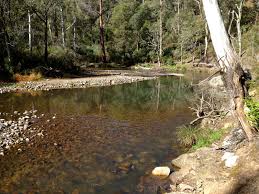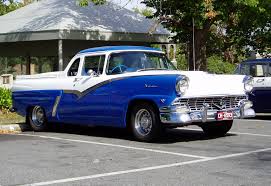
Nevil Shute was the pen name of Nevil Shute Norway (1899-1960). An English born aeronautical engineer and writer, he moved to Australia in 1950, living outside of Melbourne. According to Wikipedia he had 23 novels published including 11 post WWII set wholly or partly in Australia, the most famous being I guess A Town Like Alice (1950), On the Beach (1956) and Beyond the Black Stump (1957). Shute is not in the first rank of literary writers, but has a very straight forward story telling style which may be a little out of fashion now, or maybe it’s just that I don’t read Bryce Courtenay, Judy Nunn, Di Morrissey …
The Far Country (1952) is based around a sheep station in the Victorian high country, near Merrijig and Mt Buller and the Howqua River. (The Howqua now runs into Lake Eildon, the dam for which was constructed 1950-52.) The owners of the station, Jack and Jane Dorman, having endured some tough times, are finally rolling in money due to the Korean War wool boom.
In London, Jennifer Morton, a young typist and distant relative of the Dormans, is living with the food and heating shortages which continued on after the end of WWII as the Attlee Labour government made a valiant but doomed attempt to convert the British economy to socialism. Shute is generally critical of the shortages, although acknowledging they date back through mostly Conservative governments to the 1920s, and particularly of the National Health System, introduced in 1948 by Labour. The arguments he makes, both about the privations of life in England and the general prosperity of Australia no doubt reflect the factors which led to his own decision to emigrate.
On the spur of the moment, the Dormans send 500 pounds from their latest wool cheque to Mrs Dorman’s aunt in London. They have been sending her food parcels, lard and dried fruit mostly, but the old lady now appears to be in straitened circumstances, living on the dried fruit and a milk drink called Benger’s Food. But she is on her death bed and passes the money on to Jennifer, her granddaughter, with the proviso she use it for a trip to Australia.
Jennifer’s father, clearing out his mother’s things, finds an 1893 cook book with a recipe for fruit cake:
His eyes ran back to the ingredients. Two pounds of Jersey butter … eight weeks’ ration for one person. The egg ration for one person for four months [18 eggs] … Currants and sultanas in those quantities; mixed peel, that he had not seen for years …
The Dormans are happy to meet Jennifer off the ship in Melbourne and take her back to the farm. There she meets Carl Zlinter, a Czech doctor, but unable to be registered in Australia without three years retraining, a reffo working out his compulsory two years in a nearby camp as a timber worker. Carl with Jennifer assisting performs an impromptu amputation on a labourer trapped under an overturned bulldozer and surgery on the fractured skull of the dozer driver, on a table in a bush hut, as you do when men are about to die and the nearest real doctor is 50 miles away.
After that they inevitably start spending time together. Shute obviously loves the Australian bush, or at least the temperate rain forests north and east of the Dandenongs which were his new home, and spends a good part of the book describing the country and an abandoned gold mining town, barely discernable 50 years after the cessation of mining, where some of the action is set.
Of interest from the point of view of the Australian Legend, is that this book has a quintessential Australian setting, there is even a ‘Lone Hand’ living alone in a hut on the banks of the Howqua, and of course the timber workers camp is all male, but yet you would have to imagine Shute was largely unaware of his predecessors as an Australian writer. His central characters are a young (English) woman and a fortyish Czech doctor; he ignores, is maybe ignorant of, the fact that his setting is right in the heart of Ned Kelly country; only Jack Dorman, an Australian soldier in the First War “who drank port with the butler and never saluted anybody” matches his stereotype. In the end, perhaps Shute, as an outsider, says most about us by not attempting to add to the Legend.
I could do another whole blog on the Dormans’ cars. They go down to stay at the Windsor in Melbourne (I lived for a year, 1971, in a terrace house at the back, in Windsor Lane, when ‘playboy’ Peter Jansen was reputed to occupy the whole top floor) driving a 1946 Chevy truck – maybe a 3 ton Maple Leaf but more likely a sedan with a tray replacing the back half of the body. Jack buys himself a Ford Customline ute and then a Morris for the missus – so she doesn’t have to drive the Chev., she’s obviously not going to get her hands on the Customline. Mum and Dad’s first car – he only had a motorbike when I was born – was a pre-war Chev. I have resisted the temptation to insert here a photo of the Chev, mum, and me in flowing white robes. We probably still had it when Dad got posted to nearby Bonnie Doon a year or so after the period of this book. My oldest memories date from there, the little girls playing mothers and fathers, with me as the baby, and of me toddling into the back of the one-room school during class.

The title, The Far Country , refers to the distance not only of Australia from England, of Jennifer from her parents back in Leicester, when most travel was by sea, but also of England from Australia, of the austerity in Britain only dimly perceived by the now prosperous Dormans in the back blocks of Victoria. So yes, I enjoyed The Far Country as a simple story well told, but also as a social history of the times and locales of my earliest years.
Nevil Shute, The Far Country, first published by Wm Heinemann, London, 1952
Thank you for this review! I discovered Shute in my younger university days, and read him voraciously as light reading to balance all the Great Lit I was reading, which had to be read with notebook at hand to make erudite observations for the inevitable essays. I loved his simple storytelling, his straightforward characterisation and the way you always knew where you were with him though the plot was always absorbing. Yes, probably like Bryce Courtenay, Judy Nunn, Di Morrissey et al – though one of each of those was enough and in the case of Courtenay too much, whereas I went back again and again with Shute, and I think I may have read them all.
However when I subsequently discovered his autobiography, I discovered that he was not a man I would have liked at all. I think he had pretensions to be An English Gent, but succeeded only in being a Tory snob.
I’m not game to re-read any of my Shutes, I’d rather keep my fond memories. Like you, I would now notice what’s missing rather than indulge merely in what’s there…
LikeLiked by 1 person
Love your summary of his autobiography!
LikeLiked by 1 person
I am certainly a snob about Bryce Courtenay, though I read Jessica (and watched the mini series) to see if I should fit it into my dissertation. Shute is a better writer, spare and direct in a way characteristic of middle class English writers of his period, perhaps following Orwell (though not politically!). I’m thinking of John Wyndham for example.
You remind me I must check a biography to see if Shute was in central WA before writing Beyond the Black Stump.
LikeLike
I adored Neville Shute in my teens. As I think I said in another discussion we’ve had, when all my friends were reading Georgette Heyer (and I think Mary Stewart) I was reading every Shute I could get my hands on. I read them all, including as I recollect his autobiography, Slide Rule. He’s fascinating really because of the real “issues” he explored – like the end of the world in On the beach, metal fatigue in No highway – and the wide variety of settings. I just loved them. But, I reread On the beach a few years ago and, oh my, I was so disappointed. The writing was stilted, the characters pretty cliched. I don’t think I’ll read another but will remember him always with a great deal of pleasure.
LikeLike
I re-read On the Beach in the last couple of years and found it very comfortable in an English, 1950’s sort of way, as I did this one. Shute certainly won’t be a timeless writer. I’m trying to think of another middle ranking author from the 50’s to compare him with. Let’s say Kylie Tennant, her writing has a spark which Shute’s lacks, and so discerning readers will continue to find something in her, whereas in Shute all we get now is a feeling for times lost.
LikeLike
[…] passing, you might remember in my piece on Neville Shute I mentioned Di Morrissey, along with Bryce Courtenay and Judy Nunn, as Australian story tellers of […]
LikeLike
Thanks for pointing me to this from my piece about Josephine Kamm’s “Peace, Perfect Peace” – this sounds fascinating and I’m adding it to my wishlist.
LikeLike
Glad you found it interesting, I’m always diffident about linking to my posts on someone else’s blog. Shute was once very much admired by Australians for his writing about Australia.
LikeLike
[…] on the War, and many important industries being nationalised. (The English/Australian novelist Neville Shute was just one of many who chose not to live […]
LikeLike